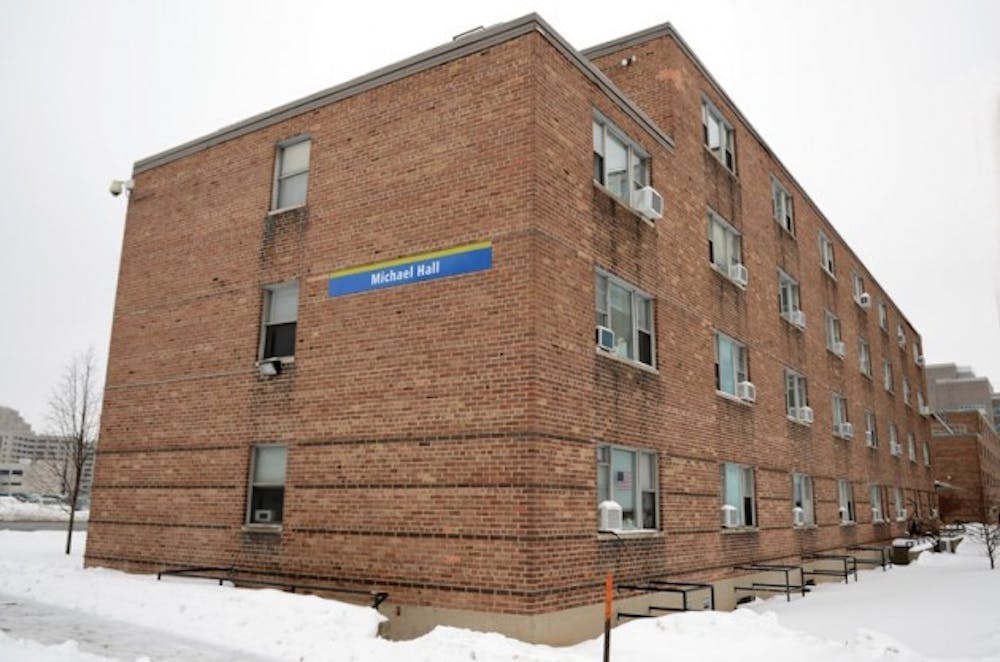If Rebecca Weitz, a junior health and human services major, needs to go to the doctor, she can’t travel over 400 miles to see her gynecologist on Long Island. Instead, she goes to South Campus.
Health Services on South Campus in Michael Hall offers students like Weitz an accessible way to get check ups without having to a hop in a car.
From condoms and pregnancy tests, to lube, dental dams and more, students have access to various contraceptives at little to no cost through health services. In the fall, they provided sexually transmitted infection (STI) testing to just over 500 students.
Last year, Health Services and Wellness Education handed out approximately 20,000 condoms to UB students. According to a sex survey conducted by The Spectrum, 56 percent of UB students use protection – female condoms or condoms.
“We refill our little bin [of condoms] five to six times a day, if not more,” said Kara Fitzpatrick, office manager of the Wellness Center. “I would say there are definitely a great number of people who take advantage of that.”
But what students may not realize is the option of specialty clinics on campus like Women’s Health Services.
“Students probably don’t know about us until they need us,” said Susan Snyder, director of Student Health Services.
Many students are unaware the specialty clinic provides genealogical care and services and counseling for women. They are also unaware of the preventative services the clinic has to offer, according to Snyder.
Women’s Health Services provides females at UB with pap smears, testing for STIs and human papillomavirus (HPV), as well as HPV shots and emergency contraception.
“Having a women’s health clinic on a college campus is great because students can stop in after class if they want and it’s not out of the way for students who don’t have their own car,” Weitz said.
To receive a pregnancy test from the clinic, students are given a handout explaining the effectiveness of the pregnancy test and what options are available depending on the outcome of the test.
A staff member at the Wellness Center will give the student options whether to take the test in the privacy of their dorm, apartment or in the Student Union bathroom with a staff member there for support.
“We aren’t interpreting the results, we are there to support the person as they take the test themselves,” Snyder said.
To receive emergency contraception, the student must sign a form allowing Health Services to bill their student account $25, which is the cost for Plan B One-Step, which may prevent pregnancy after having sex.
Nationally, for students in four-year colleges and universities, unplanned pregnancy is about 2 percent of the population, Snyder said. Even though it is a relatively low number, it can have a huge impact on students.
“We want to continue to offer the testing, and want to continue to support students as they make choices about unplanned pregnancy,” Snyder said.
Health care services also offers two types of counseling: prevention/contraception and emotional support.
Prevention counseling is for students who are interested in contraception. A student can meet with a nurse and can speak about what her options are and what would work best for her.
The second type of counseling is available for students who receive unexpected or emotional results from a positive STI result, or an unplanned pregnancy result.
“Our providers spend a fair amount [of time] talking to them about what this means, what their options are, what other resources are available to them,” Snyder said.
Women aren’t the only ones who can receive health services such as testing for STIs and HPV.
“It’s harder, I think, to get men to participate in preventative health care,” Snyder said. “For this age group we stress with them testicular cancer and doing self exams. It is recommended that men get tested for STIs annually and encourage men to take care of themselves.”
Most STIs are treatable or curable, but not all of them have symptoms.
Weitz said having a health clinic on campus allows for quick check ups or for any questions she may have. It’s a convenient alternative to travelling home to Long Island when she needs a condom. Although, she said she would only use the services as a first opinion and probably go to another doctor to confirm or reject any results.
Other than condoms, a variety of protection for safe sex and sexual health items are also given for free in the Wellness Center in 114 Student Union. The services provided by UB are available to any registered student regardless of the student’s insurance plan.
email: features@ubspectrum.com





